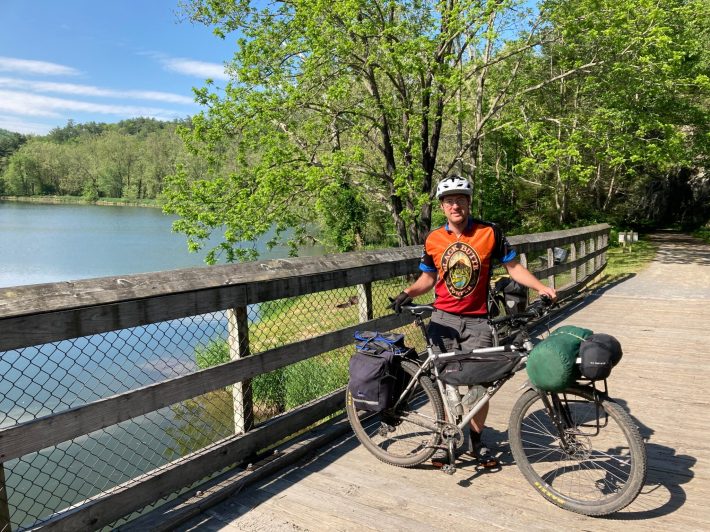A lot of ink has been spilled on the long-term impact of Covid-19 on American transportation. But less has been spilled on the impcact of long Covid on individual people who walk and bike — and what happens when the disease makes active transportation impossible.
On today's episode of "The Brake," Kea Wilson talks with John Bolecek, who built his career in bicycle and pedestrian planning for the state of Virginia before a Covid-19 infection picked up from his son's daycare changed his life, despite the fact that he was "fit, vaccinated, and boosted." That initial infection eventually led to myalgic encephalomyelitis/chronic fatigue syndrome that forces him to get around mostly by car — but it didn't lead to him questioning his commitment to building great places to bike and walk.
Tune in below, on Apple Podcasts, Spotify, or anywhere else you listen, and check out the article that inspired this story at the Virginia Mercury.
The following excerpt has been edited for clarity and length.
Kea Wilson: What sparked your interest in bicycle and pedestrian issues, initially? I'm just curious what your personal connection to it is.
John Bolecek: In college, I rode my bike around everywhere. It wasn't super serious; I just loved just the ability and the freedom to just ride everywhere and explore things and see things at a slower pace. That's what drew me to it.
Wilson: So I know that your plans changed recently. And first, I just want to say I am so sorry for the experience that you've had. It sounds really, really challenging and our hearts are with you. But if you don't mind getting a little personal, why don't you just tell me a little bit about when you contracted long Covid, and how did that change your life and the way that you think about this field?

Bolecek: I got Covid in January of 2022. There was a big Omicron wave going on, and my youngest son picked it up a daycare and brought it home and the whole family got it. And it wasn't that bad — the acute phase, at least. I had a runny nose and a cough for about a week. And I thought, you know, 'wow, this isn't going to be a big deal ... This is easier than I thought."
But then around a week after my cold symptoms went away, I started waking up feeling like I hadn't gone to sleep. Like, I would sleep in the bed, totally fine, for eight hours, and then I woke up just with this horrible fatigue, just completely unrefreshed. And that feeling has never gone away. It's just gotten worse over time. I noticed, when I stood up, my heart would race; I noticed that I couldn't exercise the way I used to anymore. Something was terribly wrong with my muscles and how my body was working.
I had to take medical leave from my job, and it's really just changed everything. I have to be very, very careful on how much I exert so that I don't crash. It's hard, because I have a family; I have things I have to do every day.
Wilson: It struck me as I was reading your column, and as I'm hearing you talk, about how many parallels there are between the policy response to long Covid and the policy response to the epidemic of traffic violence. You talk in your article about how neither issue has a dedicated federal office devoted to finding solutions. Both problems struggled to find funding, even though they have this massive impact on lots of people and huge segments of the community. I'm curious if you see those parallels, too; has your advocacy for people who bike and walk shaped your approach to advocating for yourself and other people who are struggling with this disease?
Bolecek: That's a great parallel. Some similarities I can think of is [that] you need you need strong leadership at the top of local governments, and other governments; you need state laws, federal laws, local laws, all to to make the system work so people care about implementing safer bike networks and safer pedestrian networks. You need a real nuanced conversation with a lot of advocacy and a lot of people that really understand the issue.
And I think the same thing is true for long Covid. I think a lot of people think that long Covid is just gonna go away. I've seen reports where people [said] we didn't need to do clinical trials, because [they believed] that before they got the trials up and running, everybody with long Covid will have gotten better by that point. And it's just not true.
I hope that, over time, and through things like sharing my story and all these other people sharing their stories, we can get to a point where people doing the research can can devote a lot more resources to treatment and figuring out what the physiology of long Covid is, so that whatever's causing the problem can be targeted.






